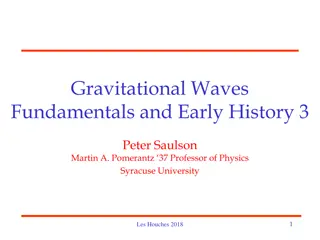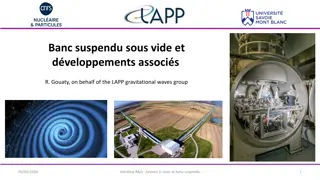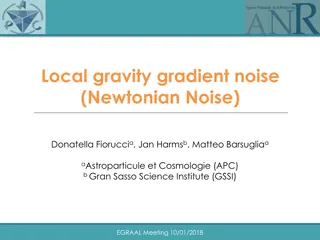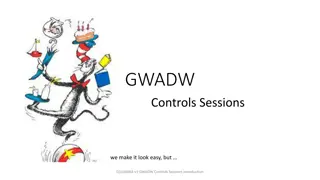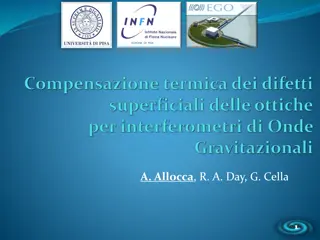Gravitational Waves: Basics and Detection Challenges
Exploring gravitational waves fundamentals, early history, and challenges in detection. Covers topics like interpreting noise power spectrum, shot noise in interferometers, radiation pressure, and quantum limits. Illustrates the importance of noise spectrum analysis and mathematical operations in un
3 views • 42 slides
Advances in Optical Bench Technology for Gravitational Wave Detectors
This content discusses the latest advancements in optical bench technology for gravitational wave detectors, focusing on precise measurements of back-scattered light, development of new optical cavities, and testing of Sagnac interferometers. Key objectives include improving suspension controls, red
0 views • 13 slides
Newtonian Noise in Gravity Gradient Measurements
Investigating the impact of Newtonian Noise (NN) on various detectors and instruments used for measuring gravity gradients. The content delves into the frequency ranges affected by NN in detectors like LIGO, AdVirgo, and KAGRA, as well as the influence of infrasound and seismic waves. The discussion
1 views • 17 slides
Advanced Topics in Control System Design and Implementation
Delve into the complexities of control system design, from system identification to modern control techniques. Explore the challenges of designing controls for systems like interferometers and discuss the integration of classical and modern control theories. This workshop offers insights on optimal
1 views • 19 slides
Detecting Gravitational Waves with Interferometers
Gravitational waves, predicted by Einstein's Theory of General Relativity, are incredibly weak ripples in spacetime that can be detected using interferometers. This method involves using suspended mirrors to reproduce free-fall conditions, enhancing signals through various techniques like Michelson
5 views • 23 slides
LIGO-Virgo Status Report
Broad picture of recent commissioning breaks for maintenance and calibration of LIGO-Virgo interferometers. The duty cycle shows good network performance with a high percentage of operational time. Alerts are increasing, and potential longer breaks in autumn are being discussed.
1 views • 4 slides
